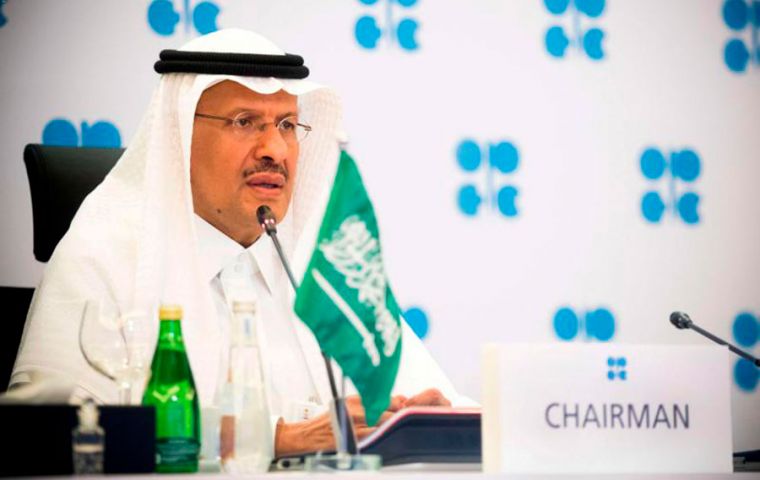MercoPress. South Atlantic News Agency
Middle East OPEC members with no plans to increase output: “caution” is the name of the game
 “Caution, a word that I know some people hate me for, but... I will continue being cautious...and adopt a long-term perspective,” Prince Abdulaziz bin Salman said.
“Caution, a word that I know some people hate me for, but... I will continue being cautious...and adopt a long-term perspective,” Prince Abdulaziz bin Salman said. As crude prices steadily climb to US$ 100 a barrel, Middle Eastern OPEC producers have no plans to increase production beyond their OPEC+ quotas, a gathering of ministers this weekend has made clear. The energy minister of the biggest oil producer in the cartel, Saudi Arabia, said that the pandemic had taught oil-producing nations one thing, and that was caution, writes Irina Slav for oilprice.com.
”Caution, a word that I know some people hate me for, but... I will continue being cautious and (mindful of) the need to retain flexibility in our strategy and adopt a long-term perspective,“ Prince Abdulaziz bin Salman said.
His stance was echoed by Iraq's oil minister, Ihsan Abdul Jabbar Ismail, who said that the cartel should stick to its original plan of adding 400,000 bpd in combined production every month to avoid surprises.
His UAE counterpart, Suhail al Mazrouei, for his part, blamed the latest price rally on geopolitical factors.
”We are all hoping for the de-escalation... I think our plan has been working, and I don't believe that the market is hugely under-supplied currently. It's the other factors that are outside our hands which are impacting the market,” al Mazrouei said.
Yet geopolitical tensions spikes tend to have a transitory effect on prices, while OPEC+'s failure to stick to its own production quotas suggests a deeper inability for most producers to boost production as much as agreed.
Saudi Arabia's bin Salman recognized this, commenting that the world's oil-producing nations may not be able to provide the supply necessary for the global economy to recover fully from the pandemic. For this, the energy minister blamed years of underinvestment in oil exploration.
One might be tempted to think that OPEC is looking after its own interests in refusing to boost production, but it appears that current oil prices are too high even for the oil-producing nations.
As several OPEC officials said earlier this month, higher oil prices contribute to inflation, which is a serious problem for most OPEC members, and sap the demand for oil.




Top Comments
Disclaimer & comment rulesCommenting for this story is now closed.
If you have a Facebook account, become a fan and comment on our Facebook Page!